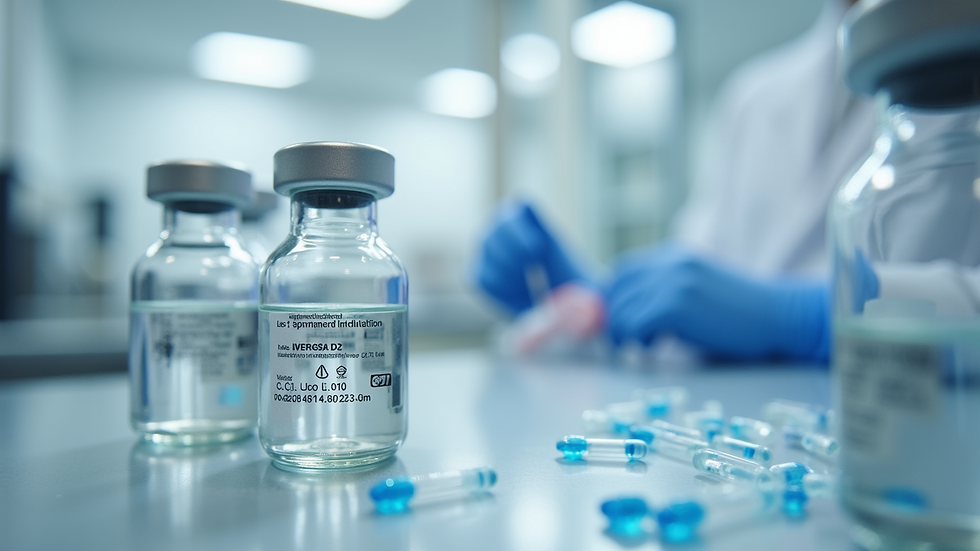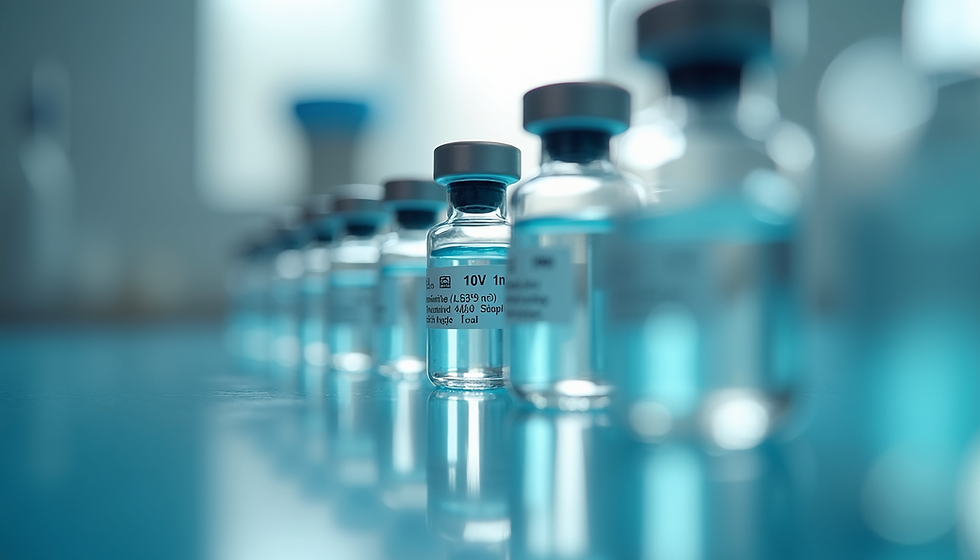How Propofol Manufacturers Ensure Quality
- Farbe Firma Admin
- Aug 25, 2025
- 4 min read
Propofol is a widely used intravenous anesthetic agent essential for inducing and maintaining anesthesia during surgeries and critical care. Ensuring the quality of propofol is paramount to patient safety and therapeutic efficacy. As a WHO-GMP certified pharmaceutical CMO/CDMO specializing in sterile injectables, including liquid ampoules, vials, lyophilized products, and emulsions, you understand the critical role of stringent manufacturing processes. This article provides detailed insights into how propofol manufacturers maintain high standards throughout production, focusing on quality assurance, regulatory compliance, and innovative manufacturing techniques.
Anesthetic Solution Production Insights: Quality Assurance in Propofol Manufacturing
Quality assurance in propofol manufacturing begins with a comprehensive approach that integrates raw material selection, process control, and final product testing. Each step is designed to minimize risks and ensure consistency.
Raw Material Sourcing: Manufacturers source pharmaceutical-grade ingredients from certified suppliers. Each batch undergoes rigorous testing for purity, potency, and contaminants before acceptance.
Process Validation: Critical manufacturing steps such as emulsification, sterilization, and filling are validated to confirm reproducibility and control. This includes equipment qualification and process parameter optimization.
In-Process Controls: Continuous monitoring during production ensures parameters like pH, particle size, and emulsion stability remain within specified limits.
Sterility Assurance: Propofol is a sterile injectable, so aseptic processing or terminal sterilization is mandatory. Manufacturers employ validated sterilization methods such as autoclaving or filtration.
Final Product Testing: Finished products undergo comprehensive testing, including assay, endotoxin levels, sterility, particulate matter, and stability studies.
These measures collectively ensure that every vial or ampoule of propofol meets stringent quality standards before release.

Regulatory Compliance and Global Standards in Propofol Production
Compliance with international regulatory standards is non-negotiable in propofol manufacturing. WHO-GMP certification is a baseline that guarantees adherence to Good Manufacturing Practices, but manufacturers often align with additional standards such as:
FDA cGMP: For products marketed in the United States, compliance with the FDA’s current Good Manufacturing Practices is essential.
EMA Guidelines: European Medicines Agency requirements emphasize quality, safety, and efficacy.
ICH Q7: This guideline provides a harmonized approach to GMP for active pharmaceutical ingredients.
Pharmacopoeial Standards: Propofol must meet specifications outlined in pharmacopeias such as USP, EP, or JP.
Manufacturers maintain detailed documentation, conduct regular audits, and implement corrective actions to ensure ongoing compliance. This rigorous regulatory framework protects patients and supports global distribution.

What Plant Is Propofol Made From?
Propofol is a synthetic compound and is not derived from any plant source. Its chemical name is 2,6-diisopropylphenol, and it is produced through a series of chemical synthesis steps in controlled pharmaceutical manufacturing environments. The synthetic nature of propofol allows for precise control over purity and consistency, which is critical for injectable anesthetic agents.
Understanding that propofol is not plant-based is important for healthcare professionals and distributors, especially when considering allergenicity and sourcing concerns. The synthetic production process also facilitates scalability and compliance with sterile injectable manufacturing standards.

Advanced Manufacturing Technologies in Propofol Production
Modern propofol manufacturing incorporates advanced technologies to enhance product quality and manufacturing efficiency:
Emulsion Technology: Propofol is formulated as an oil-in-water emulsion to improve solubility and bioavailability. High-shear mixing and homogenization ensure uniform droplet size distribution.
Aseptic Processing: To maintain sterility, manufacturing occurs in controlled environments with HEPA-filtered air and strict personnel protocols.
Automated Filling Systems: Precision filling machines reduce contamination risk and ensure accurate dosing.
Real-Time Monitoring: Process Analytical Technology (PAT) tools monitor critical quality attributes in real time, enabling immediate adjustments.
Stability Enhancement: Formulation adjustments and packaging innovations protect propofol from oxidation and degradation during storage.
These technologies contribute to producing a safe, effective, and stable anesthetic solution that meets global healthcare demands.
Partnering with a Trusted Propofol Manufacturer
Selecting a reliable Propofol Manufacturer is crucial for ensuring consistent supply and quality. A trusted partner offers:
WHO-GMP Certified Facilities: Guaranteeing compliance with international quality standards.
Expertise in Sterile Injectable Manufacturing: Including liquid ampoules, vials, lyophilized products, and emulsions.
Robust Quality Management Systems: Covering raw material control, process validation, and product release testing.
Regulatory Support: Assistance with dossier preparation and compliance for global markets.
Flexible Production Capacities: To meet varying demand and customized formulation needs.
By collaborating with an experienced manufacturer, you secure access to high-quality propofol products that support patient safety and therapeutic success worldwide.
Ensuring Continuous Improvement and Innovation in Propofol Quality
Quality assurance in propofol manufacturing is an ongoing process. Manufacturers invest in continuous improvement initiatives such as:
Regular Training: Keeping staff updated on best practices and regulatory changes.
Process Optimization: Implementing lean manufacturing and Six Sigma methodologies to reduce variability.
Research and Development: Innovating formulations and delivery systems to enhance efficacy and patient experience.
Environmental Controls: Upgrading cleanroom technologies and waste management to meet sustainability goals.
Customer Feedback Integration: Using market insights to improve product quality and service.
These efforts ensure that propofol production remains at the forefront of pharmaceutical excellence, meeting evolving healthcare needs.
By understanding the comprehensive quality measures and advanced technologies involved in propofol manufacturing, you can appreciate the complexity and precision required to deliver this critical anesthetic safely. Partnering with a WHO-GMP certified Propofol Manufacturer ensures access to reliable, high-quality products that support global healthcare providers in delivering optimal patient care.




Comments